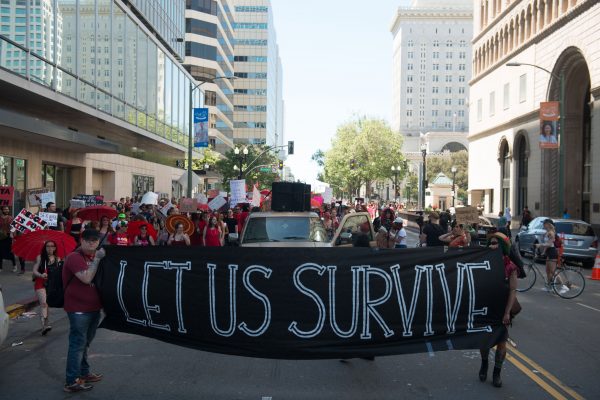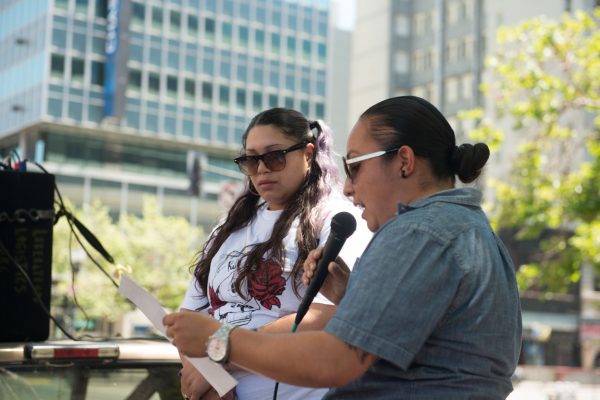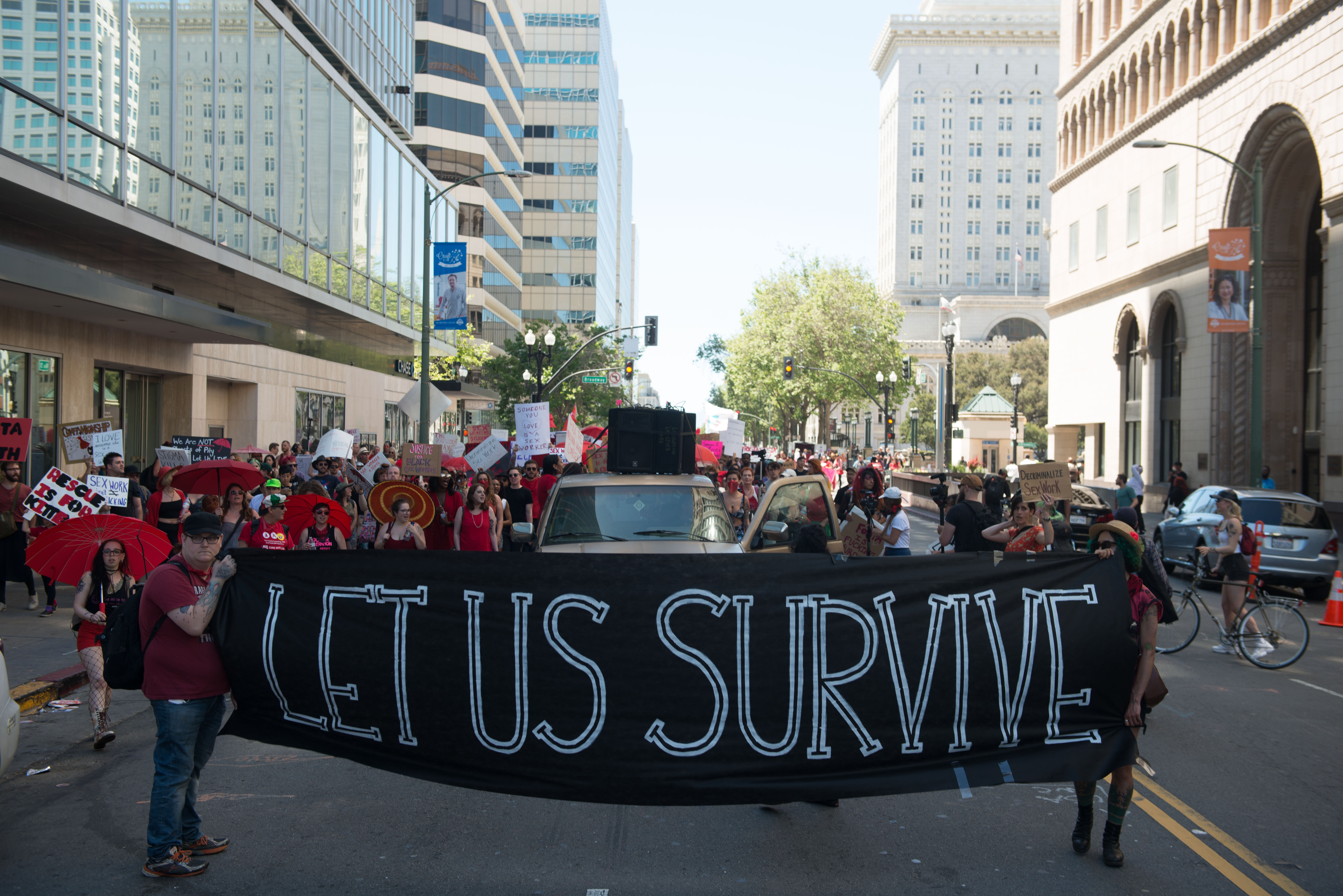
This post was jointly written by Maxine Holloway and Arabelle Raphael, co-founders of BAPS.
On the morning after the Senate passed FOSTA we texted each other about whether we should remove our ads from our social media accounts. We weren’t exactly sure what to do and knew that many other people were in the same situation. FOSTA had not yet been signed into law, and sex workers all over the country already had difficult decisions about our livelihoods and safety to make. Mercurial legal and cyber information and advice were flying around Twitter, online forums, text threads, and worker Facebook groups like wildfire.
We decided to host an emergency meeting for Bay Area sex workers that very weekend. We hoped we would gather a few people in Maxine’s small Oakland living room to share information, and figure out the best ways to move forward. Our small meeting quickly turned into 60-plus concerned workers RSVPing for the gathering. Because of the gravity of this situation the event promptly developed into a comprehensive cybersecurity and risk analysis training; an overview of current advertising platform options; and strategic action planning around local sex worker safety, media advocacy, and policy work.
But the most crucial thing that came from our meeting that we were able to come together to support each other. We didn’t all know each other, but so many of us were able to share and somewhat sooth the fear, sadness, and anxiety that FOSTA created. This worker-to-worker support and solidarity didn’t leave a dry eye in the house.
After our first meeting, we knew we realized how much work there was to be done to keep our communities safer, connected, informed, and empowered. We decided to create an organization to centralize the work needed to advocate for the health, safety & livelihoods of sex workers post-FOSTA/SESTA legislation: Bay Area Pros Support (BAPS).
An integral part of BAPS is to recognize the diverse and intersecting identities that make up our larger sex worker communities and to center the needs of sex workers who have been hit the hardest by FOSTA and experience the most criminalization. It is important to our organization leverage the power and privilege in our communities to create support for workers with fewer resources. One of the most critical subcommittees we have is our Outreach Committee, created to reach workers that are not online, and work with them to connect them with support.
The purpose of this article is to share the information and resources that BAPS has gathered thus far—on cybersecurity, general FOSTA/SESTA information, and post-FOSTA-SESTA organizing. Below are detailed notes and action plans for our meetings. One of the biggest lessons we have learned is that having community support through this process has been crucial. We hope that the creation of BAPS will encourage other sex workers who wish to organize in their communities as well.
When reading this guide, please keep in mind that everyone is making decisions that are incredibly hard, and only you can know what’s right for you. We tried to gather as much information to share as possible to empower people to make the best decisions for themselves. There is no one or “right” way to navigate this complicated situation.

SESTA Updates
Many have asked about a constitutional challenge. Two features of the legislation may enable one:
- The bill applies the law retroactively. Retroactive laws are unconstitutional. This is not enough to strike down the whole law, but that part of the bill will have to be challenged or removed.
- This bill has very broad language. Under the First Amendment, speech restrictions have to be narrowly tailored to serve a compelling government interest. Preventing human trafficking will definitely be considered a compelling government interest by the courts, but it’s possible that the broad restrictions of the bill could be found unconstitutional based on the “narrowly tailored” test.
This would require an organization to devote resources to that court battle.
Cybersecurity
We had two cybersecurity specialists come to speak with us. When we’re thinking about protecting ourselves online, it’s helpful to think about what kinds of threats we might face so that we may better prepare for them. Threats could include surveillance or hackers trying to steal our data.
When considering security, it can be helpful to use a threat model to help make decisions:
- What do I need to protect?
- Whom do I need to protect it from?
- How much do they want the information? How easy is for them to obtain?
- What happens if they get it?
- What am I willing to do to stop that from happening
Here are some immediate and simple security measures:
Use a password manager to create unique, strong passwords for each of your accounts. Make your entire online presence more secure and prevent accounts from being hacked in case one of your passwords is compromised. To manage multiple passwords, use a password manager such as LastPass or OnePassword.
Set up a two-factor authentication on your phone. Having unique, strong passwords is a great first step, but even those can be stolen. You can add an extra layer of protection known as two-factor (or two-step or 2FA) authentication. See all the services that offer 2FA at twofactorauth.org. When you enable two-factor, you’ll need something more than just your password to log into those accounts. Usually, it’s a numerical code sent to your cell phone via text messages, or it can be a code created by a specialized app (which is great if your cell phone doesn’t have coverage at the time you’re logging in), or a small, physical token like a USB key (sometimes called a U2F security key or YubiKey, named after the most popular brand).
Secure your mobile devices. Some attackers will use a method called SIM porting to transfer your phone number to a new device. If you use SMS/text messages for 2FA, this enables the attacker to access your 2FA codes. Call your phone company and tell them you want to add a pin # to your account to make any changes.
Remove your location coordinates from your photos.
Protect your data by enabling encryption on your phone. Here are the Apple instructions. Androids may vary slightly depending on your device—look for options in security settings.
We could soon be shut out of platforms like our websites, social media, Gmail, Google Drive, Dropbox, etc., possibly without warning. Secure all your content from the cloud. Download it to a hard drive. Don’t forget: photos, ad copy, reviews, videos, friends/co-workers’ contact information, client contacts, and bad date lists. Remember that even legal adult material violates Google Drive’s terms of service. Here is how to download all of your Google Drive material.
Encrypted Communication
Make sure that you have alternative means of communication with folks you know (like Signal text), especially with folks who work in isolation. Don’t let anyone get left behind.
Set up an encrypted email like Protonmail. Remember that any encrypted email is only secure if both parties are using encrypted email. If you are emailing from your Proton account to a Gmail account, it is not completely secure! Be aware that even if a company is not based in the U.S. (e.g. Proton’s servers are in Switzerland) they can still be subpoenaed by the government.
Use an encrypted text service like Signal. Again, note that it is only secure if both parties are using the same encrypted texting. To have a secure Signal phone number that is not your personal phone number you need to have two phones or two sim cards. Here is how to attach a second number to your Signal account.
Be aware of conflicting threats within your threat model. Disappearing messages are great for keeping info from law enforcement, but if you are trying to keep info about a client, letting someone know where you are, etc. you may run into problems.
Personal Websites
Many of us are choosing to not abandon our personal websites that are hosted on Square Space, Wix, WordPress, etc. just yet, but we are preparing to take our website and domains hosting outside the U.S. if needed. If our original platforms are taken away, here are the steps we’ll need to take:
- Register your domain outside the U.S. – UNI registry https://uniregistry.com/ Don’t use .com/.org /.net.
- You could try to host your site on a site that is adult friendly like cutie-stools.com & ehost.com.
- Keep your landing page clean and possibly add an “Enter” button so viewers have to take more steps to get into your site (This could help if people are “investigating” your website.)
- Make sure you opt in for registration privacy so people cannot look up your legal name by searching your domain under WHOIS.
Get a separate Tor browser for your work identity. It’s software that prevents anyone from watching what sites you visit, prevents sites that you visit from learning your physical location, and allows you to access sites that are blocked.
Do a risk/gain analysis when deciding what links to have, or not have, on your social media accounts.
- If your social media following is imperative to your business you may want to remove ALL links to websites that could be perceived as soliciting, to be on the safer side.
- It may feel ok keep a link up to your personal website on social media if that is a way that you get business, and you are willing to take the risk of your account possibly being suspended or canceled.
- We do recommend not having any links to an advertising platform (Eros, TNA, etc), or tweeting/posting your ads.
- New terms of service agreements will most likely be enforced with algorithms searching for keywords. You may want to remove hot words from your bio/description, and promote yourself as a consultant’, performer, muse, educator, therapist, artist, etc.

Advertising
FOSTA isn’t enacted yet so nothing will change immediately in terms of criminalization. Individuals face the same risks as before. When it does go into effect, the impact will likely be as follows: the same acts will be criminalized for sex workers as before (they are currently prostitution, pimping, pandering, and trafficking under state law), though they will also count as federal crimes. It is extremely unlikely that federal law enforcement will go after individual, independent workers. That is too resource-intensive and they are aiming for larger catches. That doesn’t mean it’s totally outside the realm of possibility, but that’s not usually how it goes down. People who run houses, work in the U.S. and internationally, or are immigrants to the US—those that look like part of larger enterprises—will likely count as “the bigger fish” that federal law enforcement will seek out.
What definitely will happen is that federal law enforcement will have greater power and resources to shut down advertising platforms and blatantly sex work-related websites and charge the operators of these sites with federal crimes. So that is why in the past few months many operators of advertising platforms shuttered to avoid being targeted and arrested. We are also seeing internet service providers change their terms of service to be way more restrictive of what content is posted and who can use those services (this is already happening with Facebook, Twitter, Yahoo, Google, Instagram, etc.). Eventually, we could see sex worker social media handles shut down, both those of people engaged in prostitution and those who are doing legalized sex work, as it’ll likely be done by algorithms that flag keywords.
Don’t do the work of our oppressors!
From Red Light Legal: In the immediate aftermath of SESTA/FOSTA, we saw a lot of sex workers preemptively closing sex work-related Facebook groups, folks talking about taking down bad date lists, etc. We’ve got to keep these safety tools alive as much as we can while keeping risks in mind. In the event that SESTA gets enacted, and since Facebook has changed its terms of service to get rid of sex work-related content the likely outcome will include: Facebook removing the content or closing the groups, perhaps suspending individuals accounts. It’s extremely unlikely that sex workers participating in those groups will face any legal risk. These federal agencies are banking on sex workers and businesses that facilitate sex work reacting out of fear to end sex work just as much as they are on doing that repression themselves.
In our Bay area meeting, for example, we decided to not jump ship from our Square Space/Wix websites and social media platforms just yet. But we resolved to make sure to have plans in place if/when these platforms are taken away from us. Still, everyone can make their own decision depending on what they feel comfortable with.
How can we support workers who have been hit hardest and are most criminalized?
Most of the free/low-cost platforms have been shut down. Poor folks, youth, trans, POC, and undocumented people will be hit the hardest by removing their online working options. This means more harassment, more arrests, more violence, more deaths. Here are ways to support these folks:
- Plug in/support/volunteer at local sex worker orgs.
- General increased activism and involvement for organizations that support harm reduction, racial justice, trans lives, LGBTQ rights, youth, etc.
- Using whatever forums that still exist to reach out to workers whom we don’t know and who may not be on Twitter.
- Create a sex work-specific bail fund.
- More privileged sex workers not taking front row, speaking for the community, using it as an opportunity to propel an “activist brand”, etc. Make space for others.
- Get information on new laws to sex workers that are offline—create physical fact sheets/postcards, etc.
- Community meetings in person—actively extending invitations to more marginalized workers.
How we can support each other
- Keep in touch.
- Check in on each other.
- More social events & in-person meetings.
- Encourage regular and safe clients to book doubles.
- People with larger platforms promoting others.
- Diversifying our hustles and income by sharing skills and knowledge.
Moving forward
- Sharing this info with our community.
• Create fact sheets to disseminate—shareable, well-designed, quality sound bytes, talking points, and persuasive statistics.
• Video media breaking down why SESTA puts lives at risk—great way to share info
• Fundraisers
• Getting together for work dates to set-up internet security, etc. Getting together to do cybersecurity cleansing, etc. - There are still advertising platforms out there. Make a list of the advertising sites that are applicable to your region. Find out if IDs and credit cards are needed, list prices for basic ads. We don’t know how long these platforms will stay up but it seems like the shut downs have halted recently.
Raising funds for sex workers who need help
For immediate needs/funds please contact New Whorizons (you must DM to get approval to follow them) or Lysistrata.
BAPS is currently offering funds for Bay Area workers.
Homeless sex workers: St. James Infirmary can provide services. There’s also Homeless Youth Alliance as well as online community groups that offer a live-in workspaces for work trade.
There was some concern in our group that more privileged workers could take advantage of or scam any fundraising we did. There’s been a lot of recent community hurt around this and lack of trust. In the end, however, we decided we’d rather lose some money than demand people prove their hardships.
Some proposed the idea of privately sharing our clients, linking them to each other. However, this moves our work from a misdemeanor to possibly felony or trafficking charges—organized crime is very attractive to law enforcement. Perhaps it would be safe enough to list doubles partners on our sites and link to each other that way.
Group suggestions
- We can help connect people to resources for advertising and build websites.
- People need money for rent and food, community meals.
- Collect gift cards—we need to create a distribution system.
Outreach
How do we support people who aren’t in this room? Who’s in the room? Who’s not? Which histories do we want to center? What can we do to bring people of diverse histories together? How can we support them to lead this effort?
It’s vital to create relationships with organizations that are doing work with incarcerated sex workers. We [BAPS] have some letter writing campaigns and some actions against the prison industrial complex in the works.
Don’t assume what people need. Assessing what is needed is going to take a lot of work. We resolved to reach out to street-based workers through groups who already have those relationships with folks on the street.

thank you so much for sharing this!
fyi, the link to “Remove your location coordinates from your photos” as of July 1 brings a bad pop-up; the basic url ‘ redlightlegal.org ‘ will load ok, but for now going to any link on it seems sabotaged. hope folks can get that cleared soon!
Great Content!
Thanks for sharing
UPDATE***
Do not use Cuties-Tools for your domain hosting!! They are no longer responsive and locked me out of my domain for one year! Find an adult friendly offshore hosting service that allows you to OWN your domain independently!